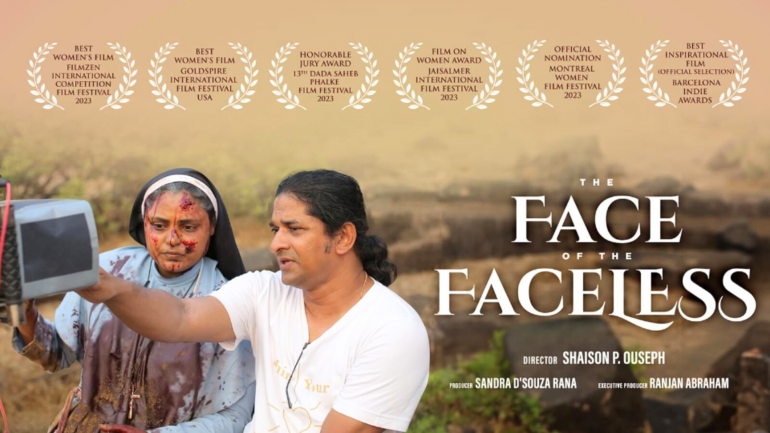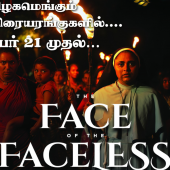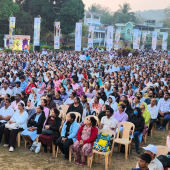Greatness Inspired Dr. Shaison P. Ouseph to Direct the Multi-Awarded Face of the Faceless

Face of the Faceless, a 2023 feature film about the life of Sister Rani Maria, has garnered 100 international awards.
Sister Rani Maria, an Indian nun from the Franciscan Clarist Congregation, worked among the poor in the Diocese of Indore, located in the largest and most populous Indian state, Madhya Pradesh. She joined the congregation after completing her secondary education.
In 2016, Dr. Shaison P. Ouseph came across a book about the nun's life, Pulluvazhil Ninu Punyavazhiyileku (From Pulluvazhy to the Path of Holiness), written by Babychan Aerathayil. Pulluvazhy is where Rani Maria was born in the southern Indian state of Kerala.
“After reading it, I realized there was a wealth of content that could be explored for a film that would touch people’s lives,” said Ouseph, who also serves as associate dean at the Xavier Institute of Communications, Jesuit-run St. Xavier’s College, Mumbai, western India.
“I understood that Sister Rani Maria was vocal about social justice, opening the eyes of the oppressed to the exploitation they endured, and helping them realize their rights as citizens,” he continued. “She was thoroughly convinced of her missionary calling. To enhance her work, she learned the local language and dedicated herself to social service—even earning a degree in sociology to better serve the poor.”
Throughout her years of mission work, Sister Rani Maria received threats to her life due to her bold stance on social issues and her efforts to empower the oppressed.
“Despite multiple death threats, Sister Rani Maria bravely continued her mission,” Ouseph said.
She was stabbed to death by her assassin on February 25, 1995, at Nachanbore Hill in Indore, at the age of 41. The assassin, hired by landlords opposed to her work among the poor, was sentenced to life imprisonment. However, Sister Rani Maria’s family forgave him, and he was released in 2006 for good conduct.
“It is unbelievable that a woman could do so much for her fellow human beings—just like Mother Teresa, Gandhi, Abraham Lincoln, or Martin Luther King did. I was deeply moved by her story,” said Ouseph. “Forgiveness is a crucial part of the journey toward healing, and this theme is central in the life of Sister Rani Maria. I began to explore the entire story from that perspective.”
Ouseph firmly believes that Sister Rani Maria’s story deserves to be told. To him, she stands as a true global example of courage and compassion.
“The injustices she fought against were local in nature, but they have universal relevance,” he explained. “Her life story is one of commitment, perseverance, and above all, the power of a mother’s forgiveness for her daughter’s killer.”
“As much as the film is about entertainment, I believe it is also about empowerment,” Ouseph said. “That was why I made a feature film on Sister Rani Maria, Face of the Faceless. It’s also the fulfillment of a long-cherished dream—one that many did not understand but has now come true.”
The film is a tribute to Sister Rani Maria’s immortal legacy as a great leader who inspired events, struggles, and triumphs. It portrays the trials and tribulations of a woman who transcended religious boundaries to realize universal unity.
“Before scripting the film, we traveled to most of the places where Sister Rani Maria had worked, spoke with people there, and gathered firsthand accounts,” Ouseph shared. “This research provided valuable insights into her life. After a few years of hard work, we completed the script by the end of 2018, and it took nearly three more years to finish the film. I hope everyone who watches the movie will be moved by her mission and vision.”
The film was produced by Sandra Dsouza Rana under the Trilight Creations banner.
Following its premiere in India, Face of the Faceless enjoyed an impressive six-week run in theaters, attracting audiences nationwide. It also drew international interest, with successful commercial releases in Europe and the Middle East.
“This movie has received 100 international awards to date,” Ouseph noted. “It has also made the Oscar eligibility list for the 96th Academy Awards in 2024.”
The film was recognized as the Best Christian Film of 2023 and has been screened at the Vatican, where it was warmly received by cardinals and bishops.
“We also met Pope Francis with the film,” he added. “I’m confident that audiences in the Philippines will embrace and appreciate it. It will be screened there soon.”
The Syro-Malabar Eastern Catholic Church beatified Sister Rani Maria on November 4, 2017, in Indore, officiated by Cardinal Angelo Amato. A museum was later erected in her honor in Ernakulam, Kerala.
“Through this film, I hope to draw attention to the needs of oppressed people around the world,” Ouseph concluded.
Radio Veritas Asia (RVA), a media platform of the Catholic Church, aims to share Christ. RVA started in 1969 as a continental Catholic radio station to serve Asian countries in their respective local language, thus earning the tag “the Voice of Asian Christianity.” Responding to the emerging context, RVA embraced media platforms to connect with the global Asian audience via its 21 language websites and various social media platforms.














